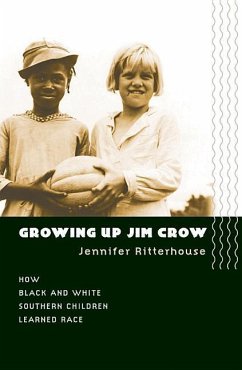Ritterhouse asks how southern black and white children in the early 20th century learned the unwritten rules that guided every aspect of individual behavior, from how blacks and whites stood, sat, ate, drank, walked, and talked to whether they made eye contact with one another. More broadly, she asks how individuals developed racial self-consciousness. Exploring relationships between public and private and between segregation, racial etiquette, and racial violence, Ritterhouse sheds new light on tradition and change in the South and the meanings of segregation within southern culture.
Hinweis: Dieser Artikel kann nur an eine deutsche Lieferadresse ausgeliefert werden.
Hinweis: Dieser Artikel kann nur an eine deutsche Lieferadresse ausgeliefert werden.








